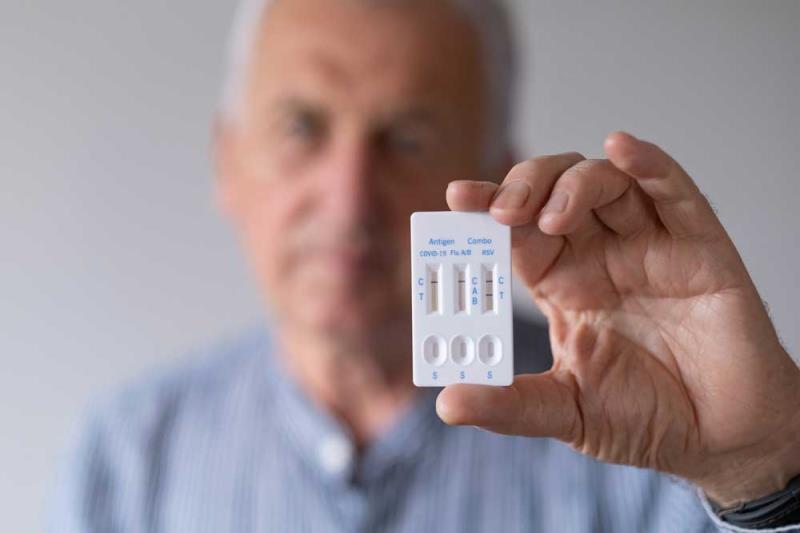A bivalent respiratory syncytial virus (RSV) prefusion F protein–based (RSVpreF) vaccine is now available in Hong Kong for prevention of lower respiratory tract disease (LRTD) caused by RSV in individuals ≥60 years of age, and for prevention of LRTD and severe LRTD caused by RSV in infants from birth up to 6 months of age through active immunization of pregnant individuals at a gestational age of 32–36 weeks.
The single-dose vaccine against RSV A and RSV B is currently the first and only bivalent RSV vaccine with a dual indication in Hong Kong. [https://www.pfizer.com.hk/en/news-en/pfizer%E2%80%99s-first-dual-indication-vaccine-for-respiratory-syncytial-virus-rsv-is-available-this-month-in-hong-kong/; RSVpreF vaccine Hong Kong Prescribing Information, March 2024]
Pivotal trial in older individuals
Indication of the RSVpreF vaccine in older individuals is supported by results of the phase III, double-blind, randomized, placebo-controlled RENOIR trial conducted in seven countries. [N Engl J Med 2023;388:1465-1477]
The trial included 34,284 individuals aged ≥60 years (median age, 67 years; male, 50.8 percent; Asian, 7.8 percent) who were healthy or had stable chronic conditions at baseline. About half (51.6 percent) of the participants had ≥1 prespecified high-risk condition (ie, current tobacco use, diabetes, or lung, heart, liver or renal disease), while 15.3 percent had ≥1 chronic cardiopulmonary condition (ie, asthma, chronic obstructive pulmonary disease, or congestive heart failure). The participants were randomized 1:1 to receive RSVpreF vaccine 120 μg (n=17,215) or placebo (n=17,069).
The trial’s primary endpoints were vaccine efficacy against seasonal RSV-associated LRTD with ≥2 or ≥3 signs or symptoms (ie, cough, wheezing, sputum production, shortness of breath, or tachypnoea) lasting >1 day, with RSV infection confirmed by reverse transcriptase polymerase chain reaction assay within 7 days after onset of signs or symptoms. The primary endpoints were calculated as relative risk of a first episode of RSV-associated LRTD in the vaccine vs placebo group in the first RSV season and starting on day 15 (ie, 14 days after injection). Statistical success criterion for vaccine efficacy in reducing the incidence of RSV-associated LRTD with ≥2 signs or symptoms was a lower boundary of confidence interval (CI) >20 percent.
Efficacy against symptomatic RSV-associated LRTD
Primary analysis in July 2022 showed vaccine efficacy of 85.7 percent (99.66 percent CI, 32.0–98.7) against RSV-associated LRTD with ≥3 signs or symptoms, and vaccine efficacy of 66.7 percent (99.66 percent CI, 28.8–85.8) against RSV-associated LRTD with ≥2 signs or symptoms. Corresponding vaccine efficacy through the end of the first RSV season (October 2022) was 88.9 percent (95 percent CI, 53.6–98.7) against RSV-associated LRTD with ≥3 signs or symptoms and 65.1 percent (95 percent CI, 35.9–82.0) against RSV-associated LRTD with ≥2 signs or symptoms, respectively. [N Engl J Med 2023;388:1465-1477; MMWR Morb Mortal Wkly Rep 2023;72:793-801]
In mid-season 2 analysis (Jaunary 2023), vaccine efficacy against RSV-associated LRTD with ≥3 signs or symptoms was 78.6 percent (95 percent CI, 23.2–96.1). [MMWR Morb Mortal Wkly Rep 2023;72:793-801]
No safety concerns in older individuals
Data from the RENOIR trial demonstrated no safety concerns with RSVpreF vaccine in older individuals. Rates of adverse events (AEs) were similar between the vaccine and placebo groups through 1 month after injection (9.0 vs 8.5 percent; injection-related, 1.4 vs 1.0 percent). The most common local reaction was injection-site pain (11.0 vs 6.0 percent), while the most common systemic events were fatigue (16.0 vs 14.0 percent) and headache (13.0 vs 12.0 percent). [N Engl J Med 2023;388:1465-1477]
Rates of severe or life-threatening AEs were similar between the vaccine and placebo groups (0.5 vs 0.4 percent), as were rates of serious AEs (2.3 vs 2.3 percent).
US CDC’s 2024 recommendation & HK experts’ advice
Given the substantial burden of RSV infection in older individuals and positive data from clinical trials, the US Centers for Disease Control and Prevention (CDC) recommends an RSV vaccine for all individuals ≥75 years of age and those 60–74 years of age at increased risk of severe RSV disease. [MMWR Morb Mortal Wkly Rep 2023;72:793-801; https://www.cdc.gov/vaccines/vpd/rsv/index.html]
According to experts in Hong Kong, available data support annual concomitant immunization with RSVpreF vaccine and seasonal inactivated influenza vaccine in older individuals. [Hong Kong Med J 2024;30:196-199; J Infect Dis 2022;225:2056-2066]This special report is supported by Pfizer Medical.
PP-A1G-HKG-0073
